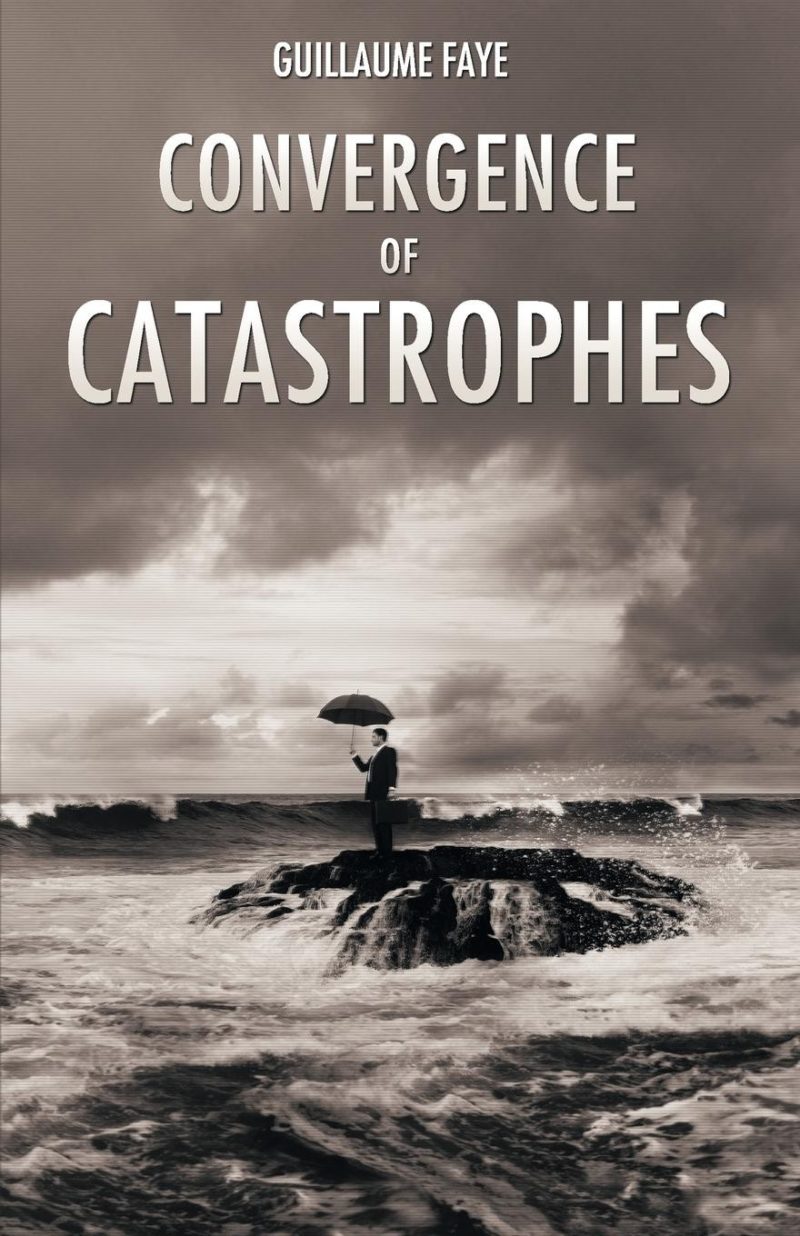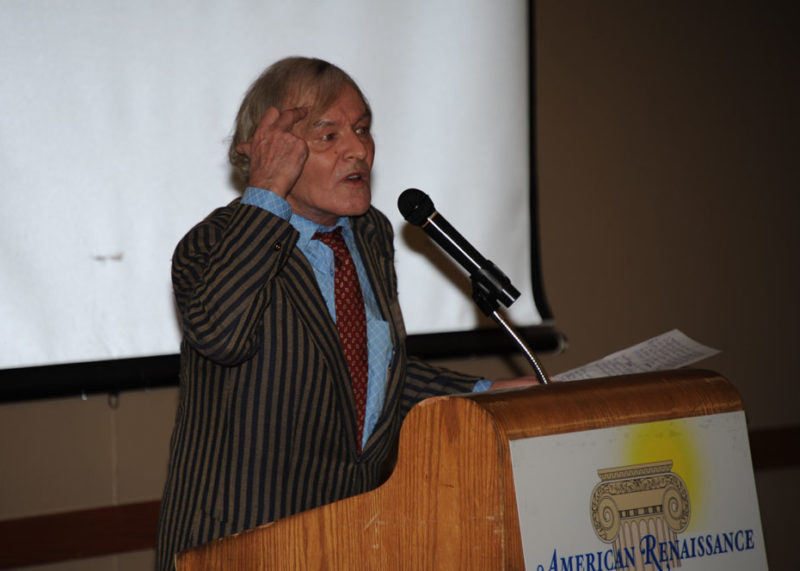Convergence of Catastrophes is the third book by French author Guillaume Faye to be published by Arktos in English. If you have read the other two (Archeofuturism and Why We Fight), you will recognize in the title a familiar theme in the author’s critique of liberal modernity: the idea that liberalism has unleashed a series of catastrophic processes now converging towards a cataclysmic global implosion.
I was keen to read this volume because it promised an elaboration on one of the key arguments Dr. Faye makes in Archeofuturism. This proved to be the case, though one difference is that Dr. Faye’s prose has shifted to reflect a higher degree of rage, directed at Europe’s and particularly France’s liberal establishment.
Dr. Faye frankly addresses the unfolding, slow-motion policy car crash no politician wants to talk about. Though in a different order and separated into more categories, he identifies the following lines of catastrophe converging in the West today:
- The collapse of the earth’s ecosystem, caused by overpopulation, half-hearted or absent environmental policies, and the belief that the Third World needs to be “developed” to the American standard—which Faye thinks would require several earths’ worth of resources.
- The degeneracy of European culture and man, brought about by egalitarianism, secularism, and social liberalism.
- The clash of civilizations, particularly between a degenerate Europe and a vigorous Islam, which Faye considers extremist by nature and never moderate (Dr. Faye deems the idea of a secular, moderate Islam a myth invented by scared Western politicians).
- The demographic coma in Europe, resulting in a shrinking and ageing population, and the lack of political will to reverse this with pro-natalist policies rather than immigration.
- The colonization of Europe by settlers from the Third World, who see the continent as a welfare El Dorado and whose continued arrival will increase ethnic tensions to the point of ethnic civil war.
- The giant economic crisis caused by the failure of the casino economy of finance capitalism, which will lead to a collapse worse than the Great Depression and to universal poverty and a new Middle Ages.
The tone of Convergence is lighter than in Archeofuturism and Why We Fight, though each page drips with sarcasm, cynicism, and animated exasperation. There is no mincing of words here.
Dr. Faye takes the darkest view of everything, predicting always the worst possible outcomes. In his view it is too late; for decades the warning signs have been ignored, suppressed, and explained away by politicians, academics, and the media. Nothing has been done. They have let structural problems grow worse in the belief that disaster will somehow be averted or that things will magically work themselves out. Though he does not state it explicitly, it is clear that Dr. Faye has no hope of any kind of counter-cultural movement with the power to halt the final cataclysm.
Towards the end of the book, Dr. Faye outlines three possible collapse scenarios: a soft one, a hard one, and a very hard one. In the soft one a total systemic breakdown is averted, but Western societies live on impoverished and in a state of permanent crisis. In the very hard one there is total breakdown. Western civilization is destroyed and the world population collapses, ushering in a new Middle Ages. Dr. Faye considers this both the most likely and the most desirable scenario. For him, history is cyclical. We are at the end of a cycle, and the harder scenario clears the decks for a new beginning, founded on entirely different—and better—philosophical suppositions. For this reason, Dr. Faye believes that this grim convergence of catastrophes is positive and necessary, and that the prospect of a new beginning should be reason for hope.
For the future, Convergence offers the vision outlined in Archeofuturism: a diversified world with a highly developed zone in the northern hemisphere and agricultural or subsistence societies in the south. Dr. Faye sees this as not only environmentally more sustainable, but as a more accurate reflection of the diversity of human societies; only a fraction of humanity, in his view, is suited to a techno-industrial society.
I generally agree with Dr. Faye’s thesis of converging catastrophes, but I fear it includes a slight element of wishful thinking. It seems Dr. Faye looks forward to the collapse; his attitude is the mirror image of the liberals’, who are either complacent or in denial. This may lead him to paint a scenario that satisfies him and that begins to unfold within his lifetime—in other words, he imagines he will be there to gloat as liberals bite the dust. He also suggests that Europeans will rise naturally from the ashes, without stressing that this depends on what we do now; it is not the natural outcome of collapse. This assumption is dangerous, because there are no guarantees of anything.
There is no guarantee that Europeans will rise from the ashes.
I am less willing than Dr. Faye to predict cataclysm sometime within the next eight years (when he wrote Archeofuturism in 1999, he predicted disaster by 2020). Nor would I assume that the lines of catastrophe will all converge within a narrow timeframe, or that European man will necessarily exist in the post-collapse world, even in smaller numbers.
To begin with, collapse scenarios can take a variety of forms, including forms in which the collapse would not be recognized as such by those living through it, or even by those living after it. A soft collapse, for example, can be one in which life remains pleasurable, so collapse is never widely recognized as such. Standards of morality weaken, the race degenerates, and a culture dissolves gradually, giving way to another that takes over therapeutically, subtly enslaving people who do not mind because they love their slavery. There may be a few bumps here and there along the way, of course, but, on the whole, this is how it unfolds. Does this not sound like the collapse of WASPdom in the United States?
Dr. Faye’s soft collapse scenario I would describe as either “deferred” or “slow.” In the first, the collapse has already occurred, but the final cataclysm is endlessly postponed, more or less like the financial crisis we are living through now. Through subterfuge, ways keep being found to levitate what should already be on the ground. In the second, the collapse unfolds gradually, in a managed and technocratic manner, and the social temperature is always kept below the threshold needed for a revolution.
One can also debate the “hard” convergence thesis. We can accept that various catastrophic trends are in place, but will they converge close enough together in time for a complete collapse, or will the catastrophes hit in succession over a long period? It is conceivable that each line of catastrophe may progress at a different speed, and that some will prompt a delaying action, thus weakening the convergence.
For example, global warming may be slowed significantly if electric cars are improved enough to trigger a phase out of the internal combustion engine over the next 10 to 15 years. In 2004, when Convergence was originally published in French, the electric car was still a distant prospect; now it is getting closer, and with decreasing petroleum reserves, it may soon make sense for motorists to make the switch. A technological breakthrough could potentially take the environmental and even the economic trend out of the equation, or at least slow them down, though this may not matter a great deal if the other trends continue.
Of course, this does not argue against the very real prospect of declining economic conditions, continuing political paralysis, and so on; it simply argues in favor of what Dr. Faye may consider the worst and most insidious of all scenarios: a “soft” convergence and a protracted or deferred collapse, whose final denouement occurs so far in the future that there are not enough of us left for it to matter any longer.
The important point is that the outcomes of collapse are not foreordained: They depend on what we do now. If some form of collapse is inevitable, then it is imperative that we establish today the bases for the world that will follow that collapse, and that we seize control of the process—including precipitating it artificially—so as to ensure for us the most favorable outcome. I believe Faye would agree with this, although he does not say so explicitly.
I must refer to this book’s latent anti-Americanism. It is only a minor part of the narrative, but it is a flaw, and Jared Taylor’s foreword points out Dr. Faye’s careless conflation of America with the American government. For many Americans, their government is their number-one enemy, and is distinct and separate from America. In Convergence, Dr. Faye accuses America of trying to weaken Europe by promoting free trade and multiculturalism, while practicing protectionism and controlling immigration to the US, when, in fact, America enthusiastically practices the same policies it promotes in Europe. Fortunately, and as Mr. Taylor points out, Dr. Faye has since revised this position: In a speech delivered in Nashville at the 2012 American Renaissance conference, he described Americans and Europeans as brothers in arms.
The philosophical foundations of the American republic are classical liberalism, but I believe it is essential—even if difficult—to separate liberalism (Americanism) from America, and to re-imagine America in philosophically non-liberal terms. To this we would need to look at the parts of American heritage that existed before, or beyond the reach of, classical liberalism. One can think of the early colonial period (before) and the wild West (beyond). This may prove vital in the effort to guarantee the continuity in the 21st century of white Americans and white American culture in the New World.
Do not look to Dr. Faye for a practical action plan; his purpose is to frankly assess present trends in the West and to point out that any cataclysmic outcome marks a beginning as well as an end. It is up to each reader to decide his course of action and translate what he has learned into effective action. For more concrete policy matters, Dr. Faye has just published Mon Programme (My Program), but it is available only in French.
Despite its imperfections, Convergence is a compelling and furious read, addressing important topics with an honesty that is rarely found and never with such intensity in a single volume. Futurology is very subjective, so one must be lenient with predictions—particularly those involving complex global events; but Dr. Faye’s analysis is fundamentally correct and will be read with profit by anyone who wants to understand how the liberal global experiment will eventually end.








 del.icio.us
del.icio.us
 Digg
Digg
Les commentaires sont fermés.